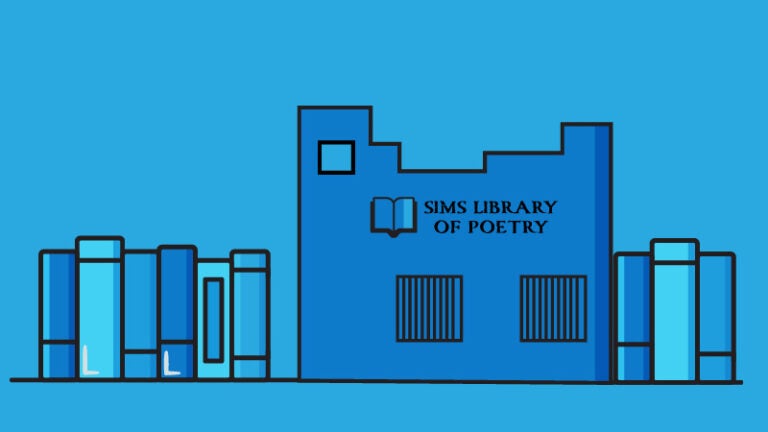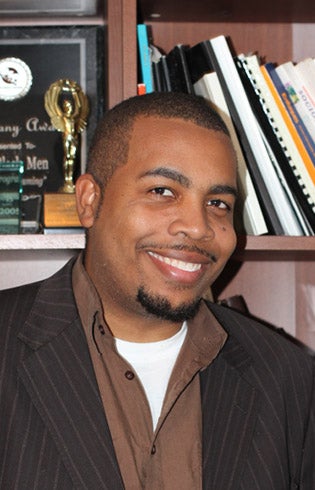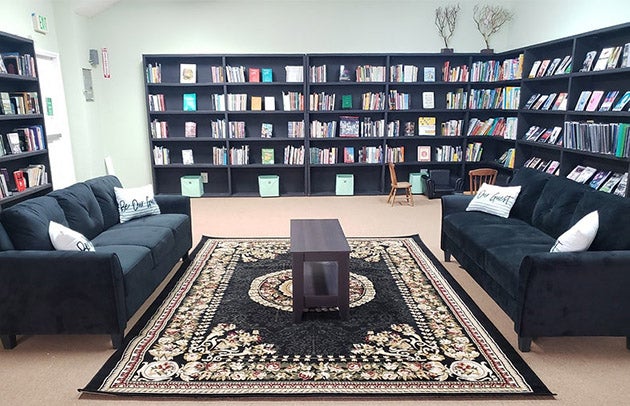
Alumnus creates the first poetry library in California, emphasizing works by poets of color
In brief:
- Hiram Sims got the idea for a poetry library while teaching lower-income students who could not find poetry books at their local libraries.
- The library has grown from 300 to more than 7,000 books, with a focus on poets of color.
- Sims wants the library to serve as a place for community and creativity, especially for the residents of Inglewood and the surrounding areas.
Poetry is homeless.
It is often recited in coffee shops, in parks and bars, its devoted authors sometimes sleeping on couches or working long hours to make ends meet. Writing time comes when one should be grabbing those few precious hours of sleep, or on a break between shifts, or that quiet hour after the kids have gone to bed.

Library founder Hiram Sims graduated from USC Dornsife in 2005 with a degree in English. (Photo: Courtesy of Hiram Sims.)
“I wanted to give poetry a home, a space where people from the neighborhood could come to read and write, to think,” says Hiram Sims, who graduated with a bachelor’s degree in English from the USC Dornsife College of Letters, Arts and Sciences in 2005.
To this end, Sims opened the Sims Library of Poetry in 2020, a small building in Inglewood, California, that features 7,250 books of poetry, several computers with internet access and a small, private writing room. It is the first poetry library in the state of California, and most of the books are by poets of color.
“I live in the neighborhood. And I wanted this space to be a part of this community, which is primarily made up of really wonderful Black and brown people,” Sims says. “I just felt like it would be a great resource for them.”
Sims explains that the library aims to have a symbolic presence as well as a physical one.
“Sometimes when you tell people you want to write poetry, they act like it’s kind of trivial. But then you come into a space like this and you see there are people who take it seriously,” he says. “So to me, I think places like this validate the part of you that has a desire to do it.”
Library in a suitcase
Growing up in different apartments across Los Angeles, Sims snatched writing time where he could get it, often in the bathroom, which provided a quiet, private place to think, he says. He remembers being impressed in middle school by Edgar Allen Poe’s “The Raven.”. A few years later, after developing an interest in girls, he would write poems about love and women.
Although he enjoyed poetry, Sims wasn’t sure he wanted to turn it into a career. That changed when he arrived at USC Dornsife and took courses with David St. John, University Professor and professor of English and comparative literature. Sims started thinking about how to write full-time.
“He showed me that there could be a life and career in something that I thought was a hobby,” Sims says.
After getting his master’s degree in professional writing from USC Dornsife in 2007, Sims started Urban Poets, a creative writing workshop that he ran out of his living room. The experience taught him how to read and critique other people’s work, how to encourage them to write new work and how to create a community in the classroom where students cared about each other’s writing. He also started teaching poetry courses at different colleges in the L.A. area.
In 2013, Sims founded the Community Literature Initiative, a nonprofit dedicated to teaching writers of color how to create and publish books. He worked out an agreement with USC to teach courses to the public using space provided by the university, which is when he launched the first incarnation of the Sims Library — a small suitcase full of poetry books.
“My students in my courses on the USC campus said they couldn’t do the required reading because they had no access to poetry books,” he explains. “So, I decided to put 80 of my own books in that suitcase and brought it to class every week. Students brought a book in and took one out.”
When one student called the bookbag the “Sims Library,” Sims got an idea.
Out of the garage

The Sims Library of Poetry catalogue reflects the diversity of its Inglewood, Calif., home. (Photo: Courtesy of Hiram Sims.)
He started thinking of how to spread poetry to more people, especially those in his Inglewood community. He began by building bookshelves in his garage. But when he filled them with the books he owned, he felt the space looked a bit sparse.
“I called every poet I knew and said, ‘Hey, I’m opening a poetry library in my garage. Will you please come and donate books?’” he recalls. On his birthday, July 6, 2019, he held an open mic and donation event for poets, family, friends and community members. “At the beginning of the day we had my 300 books, but at the end of that day, we had 2,000 books of poetry. So, it really is a library created by the poetry community itself.”
Soon, the small building that housed the day care center where Sims’ wife worked became vacant, and he decided to expand his library to a stand-alone location. In summer 2020, he moved to the library’s current home on West Florence Avenue.
Over 40% of Inglewood’s population is Black and nearly 50% identify as Hispanic. Sims says he aimed to have his library reflect the community in which it is located by featuring many works by poets of color. He also has organized many of the books by themes that local people might appreciate.
“We have, for example, the best Black poets of New York, the best Puerto Rican poets of Florida, but also poems about feet, poems about hair. One, Eat This Poem, is half poems, half recipes, where you make the food, then eat it while reading the poems,” he explains. There are also several shelves devoted to poets who live in the Inglewood area.
For now, Sims is working on expanding programs at his library, including some after-school and children’s workshops, and teaching poetry courses as an adjunct instructor at USC Dornsife. He is always thinking about the next step in growing his creation.
“An Italian man built the Watts Towers out of trash — glass bottles and cans and stuff. He said about it: ‘I only knew that I wanted to do something big,’” Sims explains. “I can really connect with that desire, that feeling of something being in your throat but you can’t get it out. That’s the library I have in my head — the one I’m looking forward to building. That one.”